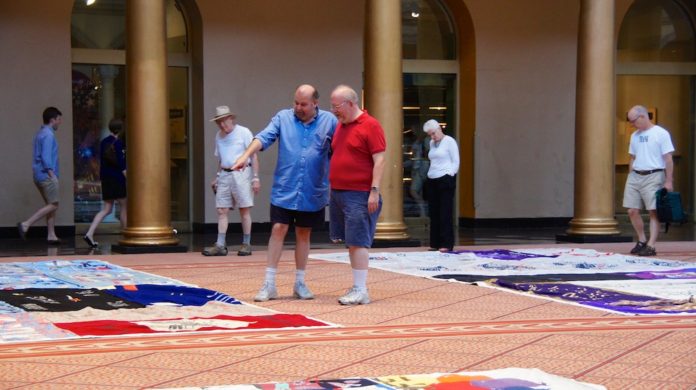
[This column appears in the January/February 2022 issue of Boston Spirit magazine. Subscribe for free today.]
Throughout history, a number of major events have defined and profoundly shaped the LGBTQ community. Some of these landmark events are positive, such as the 2016 Supreme Court ruling that paved the way for same-sex marriage under the US Constitution. The AIDS epidemic is one of those darker points in our history that marked a turning point. During the peak of the crisis in the 1980s, the LGBTQ community realized that it wasn’t possible to wait for the federal government to respond to the massive loss of life from HIV/AIDS. Instead, they learned to care for their own and establish a critical infrastructure starting at the local level to help the countless thousands effected by the crisis. Since the start of the epidemic, there have been over 700,000 people who have died from HIV/AIDS in the United States.
The development of antiviral drugs, thanks to the tireless work of infectious disease researchers like Ken Mayer of the Fenway Institute, have been game-changers, along with the rise of preventative treatments like pre-exposure prophylaxis (PrEP). These combined advancements have left many in the community falsely believing that the crisis is well behind us. That is not the same story shared by the members of Fenway’s Long-Term Survivors Group. They are still fighting and caring for each other as they have been for decades.
The group was established over 20 years ago at AIDS Action Committee. Since then, the management of the group has shifted numerous times from different organizations including Positive Directions, Justice Resource Institute (JRI) and Fenway Health, where it currently resides. The concern that the group is being pushed around from organization to organization has added to the feelings that the well-being of long-term survivors of HIV/AIDS are not a central priority for many providers. The group currently meets on Zoom due to the pandemic, but they plan to resume in-person meetings when it is safe to gather together again.
The group is currently at a maximum capacity with 18 registered members, 12–14 of whom meet regularly. The ages of the members range from mid 50s to late 70s, and they have all been HIV+ for an average of 38 years. A “sister group” recently formed at JRI is currently accepting new members. Even though the original group is full, the current members are eager to expand their sister group with new members. This time, they want to ensure that membership reflects the actual demographics of those effected by HIV/AIDS. They hope to attract older people of color and HIV+ women to the JRI group.
The leadership of the survivors group has changed as frequently as their administrative hosts. In the beginning, the group was led by a trained therapist, and then when the group was under JRI’s management, that organization offered training in facilitation to the group leader. Currently at Fenway, the group has two co-leaders, and they are supported by a licensed therapist from Fenway’s Behavioral Health team who joins the group once a month and is always available to the co-leaders for any urgent issues that arise in the group.
Over the years, the management affiliation has impacted the format of the group, ranging from following strict meeting protocols to its current incarnation, which members describe as giving them plenty of autonomy to structure their meetings to suit their needs. They meet on the odd Tuesdays of the month and their format includes a regular check-in, open discussion and speakers. Since the pandemic, they have added social meetings on the second and fourth Tuesdays just to keep them engaged during this time of social isolation. On those weeks they play games and share their meals together online. The group has really stepped up their caregiving efforts, watching out for each other after one of their members disappeared and they had no way to reach him. It turned out he had been in the hospital for months and later moved, permanently, to a long-term care facility. Now the group makes sure they have each other’s emergency contact information, and they stay in touch with each other regularly so that doesn’t happen again.
At first glance, this may sound like your typical support group. And although that is true, the group is made of fighters. Similar to the way the larger LGBTQ community took action to care for their own during the height of the pandemic, members of the Long-Term Survivors group have learned to navigate, advocate and even fight for their rights. Of the many challenges they face, there are several issues that are critical to their survival.
Ongoing issues
One of the issues is access to affordable, competent health care. It is important to remember that when people were diagnosed as HIV+ back in the 80s, AIDS was a death sentence. None of them were expected to live more than a few years. Most of these men were so sick at the time they were forced to stop working and ended up on disability and have lived on social security ever since. They do not have retirement savings or 401K funds to support them. In the early days of the AIDS epidemic in Massachusetts, the case managers at AIDS Action Committee actively lobbied health insurance providers for the development a program known as The Massachusetts Insurance Connection (MIC), a health insurance buy-in program administered by the MassHealth agency for individuals with HIV or AIDS. MIC enabled its members to not only afford all the different HIV medications, which were costly, but it also allowed them to keep their own doctors. This is essential because as people with HIV age, there are often multiple comorbidities from the virus as well as from the earlier HIV medications. It has been imperative for long-term survivors to have the consistency of medical care so their doctors can monitor these complications. One of the group members said, “The only reason I am alive today, 40 years since I got infected, is because I have had the same doctor who knows my condition and knows how to take care of me.” Now, many members in the group are starting to outlive their doctors, who are beginning to retire. When that happens the men have been given new doctors who treat their care the same way as recently infected HIV patients who have only been on the current medications. In the past few years, insurance providers decided to phase out the program and MIC stopped taking new applicants effective January 1, 2020, and will soon be eliminated.
Just like in the early days of the AIDS crisis, these men have become strong advocates for their care. They have gone to the state house, met with senators and testified at the LGBT Aging Commission’s listening session about the elimination of the MIC program. Recently, as more of programs for people living with HIV have been eliminated as the HIV funding dries up, they have been advocates for these programs. Since the pandemic began, several of the members from the group spoke up about the plan to merge the services at the Boston Living Center with programs for people suffering from drug addictions and homelessness. They made a strong case to preserve the only remaining place in the city that is 100-percent dedicated to people living with HIV since those with the other challenges have multiple organizations to support them.
Housing is another issue that the survivors group members are always fighting for. Boston has only one building, McBride House, that is 100-percent designated for people living with HIV. When that was created, most of the people with HIV then were gay men. That demographic has shifted over the decades, and many of the gay men in the house today don’t feel very safe. The group was thrilled to learn that Massachusetts was opening the first LGBTQ-friendly senior housing because they knew many of the other LGBTQ-friendly projects across the country designated a percentage of their units to people living with HIV. But they were heartbroken to learn that there will be no such designations at The Pryde, so they are preparing to fight again.
One of the issues they are the most protective about is the continuation of long-term survivor groups. “It is the only way we can empower other survivors of HIV/AIDS. We can at least tell them about what we have gone through and how to advocate for yourself. Otherwise, these folks will just give up, and think nobody cares about them” said Eddie W, co-facilitator of the LTS group.
There is hope on the horizon. This year for World AIDS Day, the Bidens proudly hung the giant AIDS ribbon on the north portico of the White House. But more importantly, President Biden did something no other sitting president has done before—he not only mentioned long-term survivors of HIV/AIDS he included an emphasis on older Americans with HIV in his new HIV/AIDS strategy that includes dedicated funding for researching the complications of HIV and aging. One of the members of the long-term survivors group said, “It feels really good to know that someone in the White House is looking out for us and we may not have to always fight by ourselves.”
As the future of the LGBTQ community in Massachusetts and the world continues to evolve and progress, thankfully we have a precious asset to our legacy—the long-term survivors of HIV and AIDS. They are the only ones to keep the stories of the crisis and they are the ones to also remind us that we must always care for every member of our community, even when the rest of the world turns their back on us.
To learn more about JRI’s Long-Term Survivors Group, contact JRI at (781) 559-4900. To learn about Fenway’s Long-Term Survivor Group, contact Frank Fleming at FFleming@fenwayhealth.org
Bob Linscott is assistant director of the LGBTQIA+ Aging Project at The Fenway Institute.
Not a subscriber? Sign up today for a free subscription to Boston Spirit magazine, New England’s premier LGBT magazine. We will send you a copy of Boston Spirit 6 times per year and we never sell/rent our subscriber information. Click HERE to sign up!







